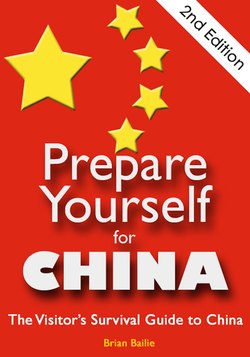Читать книгу Prepare Yourself for China: The Visitor's Survival Guide to China. Second Edition. - Brian Hammond Bailie - Страница 5
На сайте Литреса книга снята с продажи.
ОглавлениеLanguage
Grammatically, Chinese is really quite a simple language. Yes, seriously.
Its numbering system, dates, tenses and plurals are much simpler than European languages. However the spoken word is tonal, so that a slight variation of a vowel accent or an incorrect emphasis will completely change the meaning of a spoken word, and this is what usually screws up your attempts to speak Chinese.
To compound this difficulty in pronunciation, there are wide regional variations in speech. Even an expert linguist can have difficulty trying to make themselves understood; only a local can truly negotiate the language with confidence.
It would be easy to rely on an interpreter to speak for you, but you should try some Mandarin – after all, the Chinese try (when they can)(and when they can’t) to speak English.
Many Mandarin systems are easier than European languages such as: days of the week – day 1, day 2, day 3, etc; and months of the year – month 1, month 2,… you get the idea. So if you can count to twelve, and say day and month, you’ve got it. And [for example] where we have a wine glass, beer mug, milk jug, tea pot, scrap bucket, etc, the Mandarin is: container for wine, container for beer, container for tea, container for milk, container for scraps; so that once you know the word for container you’re half way there.
You can buy many great little books with translated phrases, (my favorite is the Lonely Planet pocket-sized Mandarin Phrasebook), but you can’t pull a book out every time you want to communicate with someone, so here is the list of words that I use most often (written phonetically the way I say it):
Everywhere, all the time
•Hi ~ Way said very quickly
•Hello/How are you? ~ Nee-How
•Thank you ~ She-She
•I am lost ~ Wow Me Low-La
•Water ~ Sh-Way
•Lager ~ Pee-Joe
Shopping
•How much money does this cost? ~ Dow- (sounds like cow) Sa-Chien (chien sounds like the name Ian), Dow-Sa-Chien ?
•Too Expensive ~ Tie-G’way-La
•This [thing] ~ T’suka
•That [thing] ~ Naga
•I don’t want it ~ Boo-Yow
In a taxi
•Go Right ~ Yo-G’why
•Go Left ~ Zo-G’why
•Go Straight on ~ Eejit-So
•Careful ~ Shaow-Shing
•Wait here ~ Deng-Sha
•This will do (stop here) ~ Daow-La
Numbers
Once you learn 0 to 10 you can easily count to 99.
This is how I memorize 0 to 10:
•0 ~ Ling (rhymes with nothing)
•1 ~ E
•2 ~ R (like an Irish or American ‘R’, not a polite English one; R as in ‘arse’), (just think of one & two as an emergency: ER. Or the 1st British Royal: ER)
•3 ~ San
•4 ~ Sir (again think of 3 & 4 together, San, Sir, sounds like ‘censor’)
•5 ~ Wu (wow, you’re half way to ten)
•6 ~ Le’O (think of Leo the Lion, think of six lions’ faces, and their tails sticking up behind like the top part of the 6)
•7 ~ Chee (sounds like the first part of the word ‘cheese’, so visualise a circle of cheese sliced into segments shaped like 7)
•8 ~ Ba (think of a sheep standing upright like an 8, the top circle is the head and the bottom circle is the body, the sheep says ‘baa’)
•9 ~ J’O (sounds like ‘Joe’ accentuating the J hard; but I think of geography, ninth period of school)
•10 ~ Sure (or Sir, depending on the local accent) [said very quick] (sure, you’ve made it to 10)
•11 to 19 are spoken as above as: 10-1, 10-2, etc, so that 13 is 10-3 and sounds like Sure-San
•20 to 29 are spoken as above as: 2-10, 2-10~1, 2-10~2, 2-10~3, etc, so that 25 is 2-10 ~ 5 and sounds like R-Sure ~ Wu
•30 to 99 are the same format as the 20 to 29 formula, just prefix the 10 to make the 30, 40, 50, etc, and suffix that with the last digit to make 31, 42, 53, etc. So 99 is 9-10 ~ 9 and sounds like GeO-Sure ~ GeO
•100 is E-Buy (1-00), and you start all over again so that: 247 is 2-00 ~ 4-10 ~ 7 and sounds like R-Buy ~ Sir-Sure ~ Chee
Get it? I still have to work these larger numbers out in my head like algebra equations, but once you get the basics it really is quite simple, (especially compared to something like French).
You’ll be relieved to know that for communicating large sequential numbers such as your hotel room number, which might be 2303, this is given in separate digits 2-3-0-3 (R-San-Ling-San), so if you already know 0 to 10 you’re fly’n.
While we’re on the subject of language, keep an eye out for some of the really bad English translations that have been printed on Chinese signage. One of my favorites was a large sign for a restaurant that offered a kid’s menu, sold burgers, and had a license to serve alcohol: and the name over the door was, Big American Alcoholic Family Restaurant.
And because many Chinese learn their English from US movies, you’ll see a lot of slang used too, such as a clothes boutique called: Make Yourself F**king Lovely (yes, it actually exists). And I’ve seen a sign in a hospital directing people to the gynecological department: C**t Examination.
Some of these signs are so unbelievable you just have to photograph them, because who’s going to believe you otherwise?
